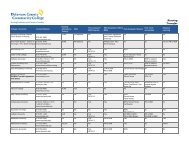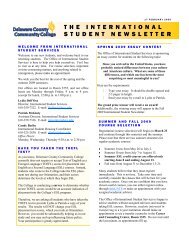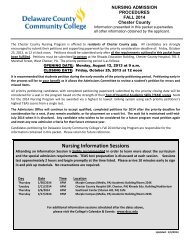2010 Catalog - Delaware County Community College
2010 Catalog - Delaware County Community College
2010 Catalog - Delaware County Community College
You also want an ePaper? Increase the reach of your titles
YUMPU automatically turns print PDFs into web optimized ePapers that Google loves.
COURSE DESCRIPTIONS 137<br />
Upon successful completion of this course, students<br />
should be able to:<br />
• Apply appropriate provisions of the Motor Vehicle Code<br />
to specific factual situations.<br />
• Demonstrate procedures for breath, urine and/or<br />
chemical tests to determine the presence of alcohol or<br />
controlled substances.<br />
• Differentiate applicable provisions of the Pennsylvania<br />
Motor Vehicle Code and the Criminal Code.<br />
• Detail the role of PennDOT and traffic safety enforcement.<br />
• Cite provisions of the Motor Vehicle Code for issuing<br />
citations and arresting individuals for code violations.<br />
2 Credits 1 Weekly Lecture Hours<br />
1 Weekly Laboratory Hours<br />
MPT 105 Motor Vehicle Collision<br />
Inspection and Related Issues<br />
This course is designed to develop an understanding of<br />
the relationship of the cause and analysis of vehicle<br />
collisions. Proper identification and documentation of<br />
physical evidence as it relates to collisions upon the<br />
highway, as well as collision scene, traffic direction and<br />
control will also be addressed.<br />
Upon successful completion of this course, students<br />
should be able to:<br />
• Define reportable and non-reportable, traffic and nontraffic<br />
motor vehicle collisions.<br />
• Perform the proper sequence of action at collision scene.<br />
• Recognize appropriate legal requirements pertaining to<br />
the need to complete state traffic collision reports.<br />
• Utilize proper search technique for physical evidence at<br />
collision scene.<br />
• Specify proper method for measuring skid marks based<br />
on type and extent of skid.<br />
• Identify the term hazardous materials.<br />
• Define why hazardous materials are a problem and<br />
who has to deal with them.<br />
• Apply PennDOT basic safety guidelines.<br />
1 Credit 1 Weekly Lecture Hours<br />
MPT 106<br />
Patrol Procedures and<br />
Operations<br />
This course presents the principles of police patrol procedures<br />
and operations as the foundation at any police<br />
department. It introduces the student to the mental preparation<br />
necessary to effectively perform duties and function<br />
as a patrol officer.<br />
Upon successful completion of this course, students<br />
should be able to:<br />
• Apply standard accepted principles of police patrol.<br />
• Detail incident procedures for vehicular accidents and<br />
violations as well as apprehension of suspects.<br />
• Specify arrest, impounding, and security procedures<br />
applicable to patrol activities.<br />
• Define human relations skills applicable to<br />
patrol procedures.<br />
• Delineate Miranda warnings requirements.<br />
• Identify purposes and procedures for safe roadblocks.<br />
• Identify markings and colors common to gangs in<br />
Pennsylvania.<br />
3 Credits 2 Weekly Lecture Hours<br />
1 Weekly Laboratory Hours<br />
MPT 107<br />
Principles of Criminal<br />
Investigation<br />
This course is designed to present basic principles of<br />
criminal procedures. It defines the role of a responding<br />
officer at the scene of a police event as well as,<br />
demonstrates the technical capacity to effectively conduct<br />
crime scene management preliminary investigations and<br />
other patrol-related investigations.<br />
Upon successful completion of this course, students<br />
should be able to:<br />
• Define a preliminary investigation. Identify the general<br />
unreliability of eyewitness identification and steps to<br />
make such identifications more reliable.<br />
• Coordinate and apply methods of establishing value of<br />
stolen and recovered property.<br />
• Demonstrate proper procedures for conducting the initial<br />
investigation of rape, sexual assault and sex crimes.<br />
• Recognize the most common forms of drugs.<br />
• Define proper surveillance techniques.<br />
• Apply principles of preliminary, crime site and<br />
follow-up investigation.<br />
• List applicable rules of evidence.<br />
• Detail applicable procedures to protect crime sites and<br />
to preserve evidence.<br />
• Perform principles of interview and interrogation.<br />
• Differentiate criminal investigation from civil investigation.<br />
3 Credits 3 Weekly Lecture Hours<br />
MPT 200<br />
Human Relations<br />
This course introduces the basic principles by which<br />
students can improve their observation skills and perceptions<br />
of human behavior. Other topics addressed are<br />
sensitivity issues and how people react to authority. The<br />
importance of understanding cultural differences and<br />
ethnic intermediation will be addressed.<br />
Upon successful completion of this course, students<br />
should be able to:<br />
• List and describe basic universal aspects of the<br />
communication process.<br />
• Identify the impact of role awareness, reference groups<br />
and motivation of human behavior.<br />
• Apply proper procedures for conducting initial<br />
investigation of bias/hate crimes.<br />
• Process legal requirements regarding emergency<br />
detention of a mentally ill person.<br />
• Categorize necessary information to be presented in<br />
an oral statement.<br />
2 Credits 2 Weekly Lecture Hours<br />
MPT 202<br />
Crisis Management<br />
This course enhances the students ability to make<br />
judgments and understand the various elements of<br />
juvenile crime and the juvenile criminal justice system.<br />
To enable students to understand how to bring a dispute<br />
under control will be defined. This course will also teach<br />
behavioral skills necessary for the successful and positive<br />
resolution of dispute situations. The ability to identify<br />
and learn the necessary skills for conflict management<br />
will be thoroughly addressed.<br />
Upon successful completion of this course, students<br />
should be able to:<br />
• Describe and apply Constitutional and other legal<br />
requirements for arresting an individual or taking the<br />
individual into custody.<br />
• Specify and demonstrate procedures required for arrest of<br />
individuals and for searches of those taken into custody.<br />
• Delineate unique problems involved in the detention of<br />
mentally ill, emotionally unstable and physically<br />
handicapped individuals.<br />
• Describe and apply principles for use of force in arrest<br />
and custody situations.<br />
• List procedures for extricating hostages and responding<br />
to prisoner escapes.<br />
• Identify proper safety procedures before entering a dispute.<br />
• Identify the scope of and the authority of the<br />
Juvenile Court.<br />
• Define juvenile delinquent, child in need of supervision<br />
and runaway.<br />
• Define elements of the Domestic Violence Act.<br />
2 Credits 2 Weekly Lecture Hours<br />
MPT 204<br />
Firearms<br />
This course is designed to teach police officer candidates<br />
the fundamentals of proper use of firearms. The course<br />
incorporates application of the tactical and decisionmaking<br />
skills necessary for them to apply this critical<br />
skill in actual situations to protect themselves and the<br />
public from harm.<br />
Upon successful completion of this course, students<br />
should be able to:<br />
• Apply safety rules when using firearms.<br />
• Illustrate proper procedures for use of pistols,<br />
shotguns and holsters.<br />
• Define deadly and non-deadly force applications.<br />
• Identify basic principles of ballistics.<br />
3 Credits 2 Weekly Lecture Hours<br />
1 Weekly Laboratory Hours<br />
MPT 205<br />
Operation of Patrol Vehicles<br />
This course is designed to teach the skills necessary for<br />
safe operation of police vehicles. Students will be wellversed<br />
in the control and handling of an emergency<br />
response vehicle. Mastery of the principles of safe driving<br />
coupled with refinement in driving skills under adverse<br />
and simulated emergency conditions will sharpen the<br />
students driving reactions.<br />
Upon successful completion of this course, students<br />
should be able to:<br />
• Operate police vehicles under normal and emergency<br />
circumstances.<br />
• Describe and analyze an officers responsibilities for civil<br />
and/or criminal penalty in case of police vehicle accident.<br />
• Demonstrate skills for safe driving and pursuit of<br />
fleeing individuals or vehicles.<br />
• Detail proper vehicle protection systems.<br />
2 Credits 1 Weekly Lecture Hours<br />
1 Weekly Laboratory Hours<br />
MPT 206<br />
Report Writing/Case<br />
Preparation<br />
This course is designed to teach and demonstrate evaluation<br />
techniques for accurately recording an incident<br />
report. The course enables students to identify the<br />
charac-teristics essential to a good report as well as<br />
check for completeness and accuracy.<br />
Upon successful completion of this course, students<br />
should be able to:<br />
• Apply techniques of listening and one-on-one<br />
communication.<br />
• Apply rules to prepare police officers as witnesses.<br />
• Illustrate written reports and note-taking skills.<br />
• Demonstrate public communication as a police officer<br />
through prepared speeches, testimony, and<br />
extemporaneous talks.<br />
• Perform proper procedures of notification to a victims<br />
family of death or injury.<br />
• Specify communication techniques for emergency<br />
notification.<br />
• Identify characteristics as essential to a good report.<br />
• Define the purpose of the law of evidence.<br />
2 Credits 2 Weekly Lecture Hours<br />
MPT 207<br />
Emergency Response Training<br />
This course trains the police officer candidate to provide<br />
immediate emergency care prior to arrival of paramedical<br />
aid to the site. It provides the student with the knowledge<br />
and skills necessary to work as a first responder in an<br />
emergency to help sustain life, reduce pain, and minimize<br />
the consequences of injury or sudden illness until<br />
additional medical help arrives.

















